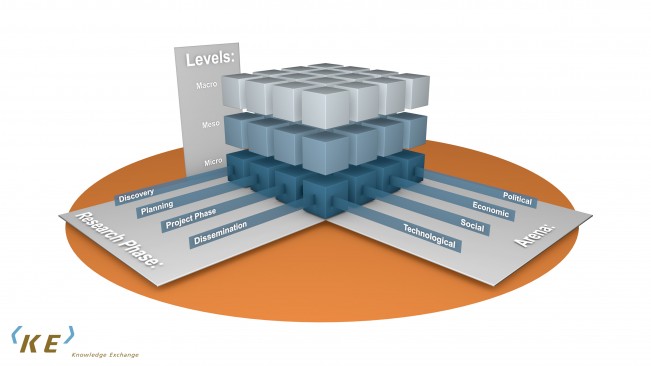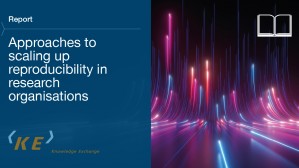
As part of its work on Open Science, the Knowledge Exchange (KE) are currently exploring the role of Persistent Identifiers (PIDs) within modern-day research. To better understand what is needed to build and exploit a well-functioning PID infrastructure for research, we wish to commission a consultant to undertake further investigation, analysis and recommendations, to identify best possible strategic and operational paths to achieve a well-functioning PID infrastructure for Knowledge Exchange (KE) member states and beyond.
We are inviting consultants to submit proposals to undertake work around 'PIDs: Risk and Trust'. Detailed information around the background and scope of the PIDs: Risk and Trust work is provided below, along with suggested timelines for completion, selection criteria and contact details for key personal.
All proposals for this work must be received by Knowledge Exchange before Monday 26 July 2021.
Context, Purpose and approach of the PID Risk & Trust activity
Persistent Identifiers (PIDs) and their infrastructures are argued to be of significant strategic importance, to the increasingly digital reality of modern-day research. As part of its work on Open Science, Knowledge Exchange (KE) wish to work with an expert consultant to identify, through investigation, analysis and recommendations, what could be the best possible strategic and operational paths to achieve a well-functioning PID infrastructure for Knowledge Exchange (KE) member states and beyond.
Our aim is to identify the main risks when pursuing a well-functioning PID infrastructure for research, and to better understand the most important elements of trust in creating said infrastructure. Equally important is an analysis that reveals how outcomes and knowledge emerging from this investigation can be transformed into stakeholder recommendations.
The work should consider community agreed guiding principles and practices, with the provider and user actor-perspectives in mind, addressing technical, social, economic, and political arenas. We are interested in how to best act at all levels with the two aspects "risk" and "trust" that are believed to be fundamental to the de facto adoption (that is crucial to achieve the required ubiquity) of a well-functioning PID infrastructure.
Outcomes and recommendations from this exploration should be mapped to KE's Open Scholarship Framework, aiding identification and structuring of potential solutions.

The scoping document
A group of experts, the Knowledge Exchange Task & Finish group (T&F group) on PID Risk & Trust have worked on a scoping document that serves as a detailed input and a starting point for this work.
Chapter 1. to 4. indicate the general purpose, questions and aspects we're interested in. Chapter 5 provides a detailed insight in possible approaches to the work leading to case studies for the KE countries, as identified by the Task & Finish group; Chapter 6 and 7 inform about aspects these case studies will address, and how these will be combined in a summary along risk and trust issues. Chapter 8 and 9 state the wished-for analysis findings and consequent recommendations.
You can read the scoping document here.
Work required by the Consultant
We are looking for a proposal, informed by the provided scoping document, to deliver three main outputs:
- case studies of the PID infrastructures in the KE countries;
- analysis of risk and trust aspects for PID infrastructures;
- recommendations to stakeholders how to mitigate risk and increase trust towards a well-functioning PID infrastructure.
Your proposal should also demonstrate and clarify your approach around how you intend to;
- answer the question: what the main risks are when pursuing a well-functioning PID infrastructure for research
- increase our understanding of the most important elements of trust in a well-functioning PID infrastructure for research
- analyse how outcomes and knowledge emerging from this investigation can be transformed into stakeholder recommendations.
We expect the proposal to indicate:
- the overall approach and activity outline to realise the three requested outputs, including approaches to:
- methodologies
- information gathering
- case study outline
- analysis to identify patterns and themes
- usage/reference to openness framework
- types of outcomes (e.g., report, slide deck, other)
- interaction with experts in the T&F group(e.g., progress updates/consultation; formulation of conclusions and recommendations)
- dissemination approaches (presentations, webinar, workshop, other)
Selection Criteria/Knowledge and expertise required by the consultant
Knowledge Exchange (KE) is looking for an experienced interviewer, analyst, author, and presenter with expertise on Open Science and PID infrastructure.
Knowledge Exchange will review all proposals and make a decision on their value and feasibility based on the following selection criteria:
- Concise, coherent and complete proposal, reflecting requests in the ‘Call for Proposals' and scoping document
- Overall quality and clarity; convincing that the objectives will be achieved
- Good general understanding of the work of Knowledge Exchange
- Clear understanding of the aims and requirements of this activity
- Previous subject knowledge (Open Science, identifiers, infrastructure, policy)
- Solution based, creative, and efficient approaches
- Excellent communication skills with good command of both written and spoken English
- Value for money
Expected deliverables
The final deliverables of the work are expected to be:
- Case studies on the PID infrastructures of the six KE countries, to be published by KE. We estimate one, perhaps two interviews with the right person, per country would probably suffice. Follow-up e-mail questions may be required.
- Questions and responses gathered (and used for the case studies mentioned above). These will be used as input for comparison and analysis. This information will be for use of Knowledge Exchange and the T&F Group only (not published externally). The consultant should propose how they will provide this information to the T&F Group
- Outcomes and conclusions of the comparison and analysis. These will be used as input to formulate recommendations. These should also be mapped to the KE Open Scholarship Framework. This information will be for use of Knowledge Exchange and the T&F Group only (not published externally). The consultant should propose how they will provide this information to the T&F Group.
- Final publication (report) including:
- Outcomes and conclusions from the analysis
- Recommendations for stakeholders
- Inclusion of feedback rounds for comments from the T&F Group
- Support in disseminating the final publication. The specific contributions to be agreed with Knowledge Exchange but may include promoting and sharing via your own social media and networking channels, as well as presenting the work at relevant conferences on behalf of Knowledge Exchange (additional costs for travel and expenses can be agreed)
Estimated timescales
In your proposal, please include a table that clearly outlines the tasks that you will undertake, the order and dependency of activities being completed, as well as estimated effort (in days) to complete the tasks.
Our initial estimate for this activity is that work should start in September 2021. Deliverables1. to 4. should be accomplished before summer 2022. Deliverable 5 should be completed by the end of 2022.
We estimate this work to take around 30-35 days to complete, however we are happy to consider proposals that justify if more or less time is required. Please also allow time in your proposal to include regular catch-up calls between the consultant, Knowledge Exchange leads, Expert lead and Knowledge Exchange Office, in order to provide updates and address any questions or issues. The frequency and length of these meetings can be agreed. From our experience, approximately 30 minutes every other week is adequate.
Less frequent meetings will also take place between the consultant, the whole T&F Group and Knowledge Exchange Office on a regular basis. We estimate these will take 90 minutes approximately every 4-6 weeks or as required.
Format of response
We highly appreciate clear and concise proposals*, covering at least:
- Overall approach and activity outline to realise the three requested outputs (case studies, analysis, recommendations)
- Details of the proposed information gathering approach, analysis methodology (e.g., use of tools, coding, formats of output),
- indicative descriptions/formats of the five deliverables
- Risk assessment
- Budget breakdown (excluding VAT) showing staff and other costs
- Starting date and availability of the consultant to do the work
- Likely timetable
Any reasonable travel expenses, incurred as a result of this work, will be paid separately.
- Please attach your CV and evidence of your past work, separately.
* You may add explanatory annexes, but the proposal and bid should be self-explanatory.
Key contacts
For any questions on practical matters (e.g. bid, payment, contract, presentation), please contact the Knowledge Exchange Administrator:
- Sarah James (sarah.james@jisc.ac.uk)
For questions on content and all other matters, please contact the Knowledge Exchange Lead and Co-Lead of the KE Task & Finish group on PIDs:
- Frank Manista (Frank.Manista@jisc.ac.uk)
- Josefine Nordling (Josefine.Nordling@csc.fi)
Submission details and timescales
Your proposal, demonstrating how you meet the tasks and the selection criteria should be submitted to the Knowledge Exchange Administrator: Sarah James, sarah.james@jisc.ac.uk before Monday 26 July 2021.
It would be appreciated if you can let Sarah (sarah.james@jisc.ac.uk) know that you intend to respond to this Call before Monday 5 July 2021, so we can plan the evaluation process according to the number of expected proposals to undertake this work.
We aim to inform all bidders on our decision by Tuesday10 August 2021.
The successful consultant will be expected to start work in or around September 2021
As Knowledge Exchange Group liaison, Frank Manista and Josefine Nordling will lead this activity; first contact within the T&F group will be Rene Belsø of DeiC in Denmark.
IPR
The IPR of the work undertaken as part of this consultancy will remain with Knowledge Exchange.
Knowledge Exchange
Knowledge Exchange (KE) is a collaboration between six national research supporting organisations - CSC (Finland), CNRS (France), DeiC (Denmark), DFG (Germany), Jisc (UK) and SURF (the Netherlands) - working together to support the use and development of ICT infrastructures for higher education and research. Central to KE's mission is the development and support of digital infrastructures, communities of practice, and national and international policies to promote open scholarship. Towards that goal, KE conducts research to understand developments in evaluation, incentives, and dissemination within scholarly communications and research.









